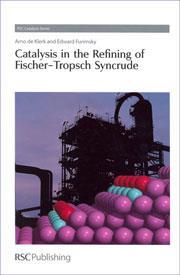Catalysis in the refining of Fischer-Tropsch syncrude
Catalysis in the refining of Fischer-Tropsch syncrude
Arno de Klerk and Edward Furminsky
Cambridge, UK: RSC Publishing 2010 | 294 pp | ?121.99 (HB)
ISBN 9781849730808
Reviewed by Malcolm Green

There is a growing interest in Fischer-Tropsch (FT) synthesis of hydrocarbons.
This book provides a general overview of the catalysts that will be needed to convert FT syncrude into useful products, especially on catalysts required to upgrade syncrude to transportation fuels.
After a brief overview of the production of the feedstock for FT synthesis, namely a mixture of carbon monoxide and hydrogen gas, the FT process itself is discussed - the reactions involved and the factors influencing the composition of the resulting syncrude. The technology, deactivation problems and operating conditions are featured.
Chapter 5 (100 pages long with 560 references) describes the central focus of this book namely the catalytic upgrading of the FT syncrude using process such as oligomerisation, isomerisation, hydroisomerisation, cracking, hydrocracking and hydrotreating. Oligomerisation is fully discussed and the properties of many differing acid catalysts are compared. The upgrading of FT waxes and FT oxygenates is considered, and the selection of catalysts used in FT syncrude refining is discussed.
The various areas attracting patenting activity are outlined with a listing of recent patent literature.
Overall, there is a great deal of information in this book. It is well organised, with useful diagrams and a great deal of data summarised in tables. The text is clearly written and succinct.
This book is most suitable for chemical engineers, but less so for pure chemists who might wish to learn more about what is known about the intimate details of the mechanisms by which these many different catalysts carry out their conversion. However, such details are quite rare and heterogeneous catalysts have, in many cases, hidden their secrets.












No comments yet